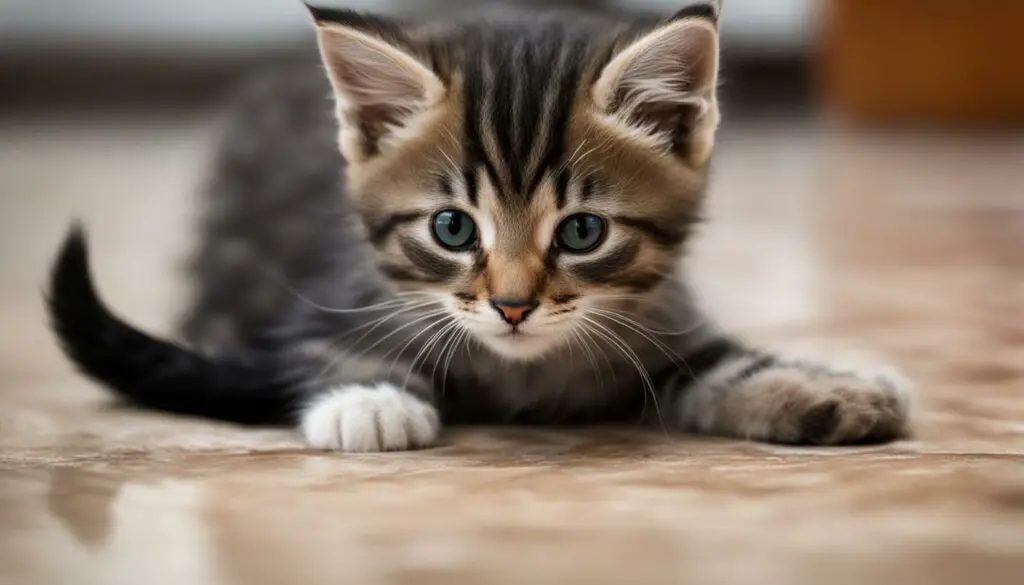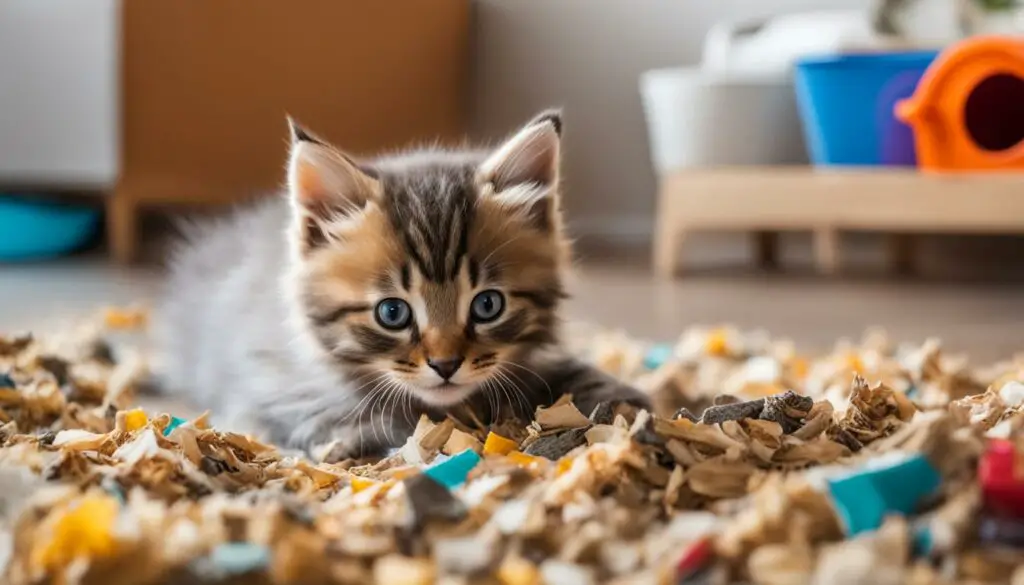Many kitten parents experience frustration when their 12-week-old kitten refuses to use the litter box. In this article, I will provide practical solutions and tips to help you navigate this essential journey with your fur baby.
Key Takeaways:
- Understanding the importance of litter box training for your kitten’s development.
- Ruling out any potential medical issues that may be causing litter box problems.
- Introducing the litter box at the appropriate time for your kitten’s age.
- Choosing kitten-safe litter and the right litter box for your furry friend.
- Providing positive reinforcement and seeking professional help if needed.
Understanding the Importance of Litter Box Training
Litter box training is a crucial aspect of feline development. It plays a significant role in helping kittens understand proper elimination behaviors and keeps your home clean. By establishing good litter box habits early on, you can set your kitten up for a lifetime of successful litter box use.
There are several benefits of litter box training for kittens. Firstly, it promotes cleanliness and hygiene in your home. A well-trained kitten knows to use the litter box for eliminating waste, reducing the chances of accidents and unpleasant odors. Secondly, litter box training helps establish a routine for your kitten, allowing for better management of their bathroom needs. It creates a structured environment that contributes to their overall well-being and comfort.
Proper litter box training also helps prevent behavioral issues in cats. When kittens are not adequately trained to use the litter box, they may resort to inappropriate elimination, such as urinating or defecating outside the box. This can lead to frustration for both the kitten and their human companion. By investing time and effort into litter box training, you can prevent these behavioral problems and foster a harmonious relationship with your feline friend.
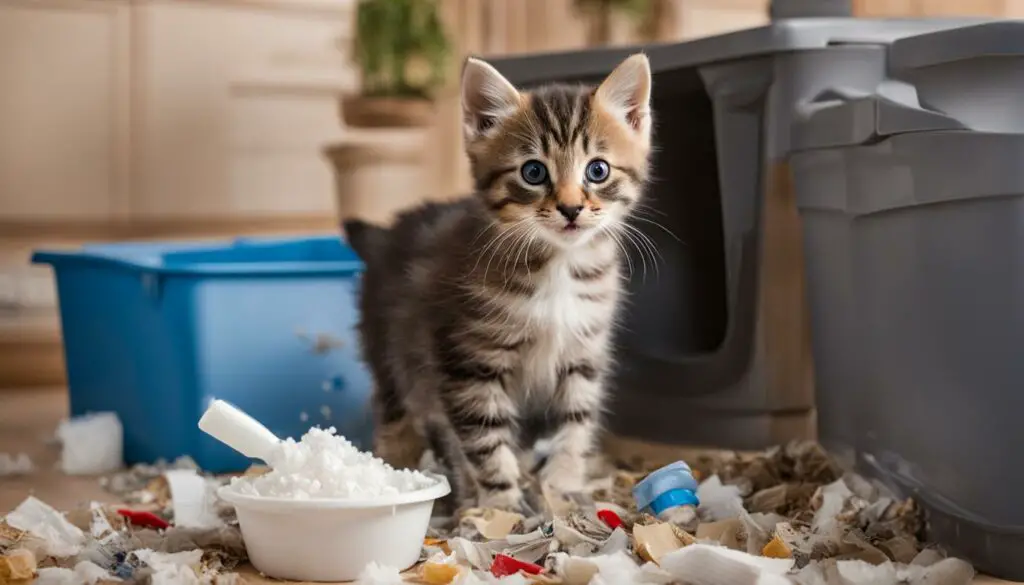
To ensure successful litter box training, it is important to be patient, consistent, and use positive reinforcement. Kittens learn through repetition and reward, so praising and rewarding your kitten when they use the litter box correctly will reinforce the desired behavior. Additionally, make sure to keep the litter box clean and easily accessible for your kitten to encourage frequent use.
Rule Out Medical Issues
Before addressing behavioral solutions, it’s important to rule out any underlying medical issues that may be causing your kitten’s reluctance to use the litter box. Diarrhea or other health problems can make a kitten avoid the litter box. Consult with a veterinarian to ensure your kitten’s health is not the root cause.
When kittens experience health issues such as diarrhea, they may associate the litter box with discomfort or pain. This can lead them to avoid using it altogether. By ruling out any medical issues, you can address the root cause and provide appropriate treatment, allowing your kitten to regain confidence in using the litter box.
A veterinarian will be able to examine your kitten, perform necessary tests, and provide guidance on managing any health problems. It’s essential to address medical issues promptly to ensure your kitten’s well-being and to set them up for successful litter box training.
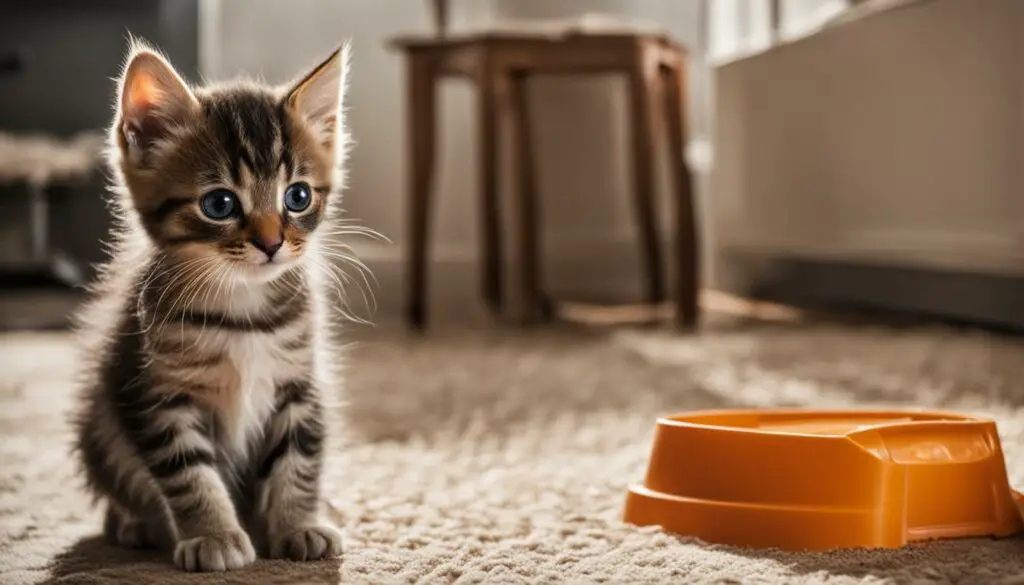
Common Health Problems in Kittens
- Gastrointestinal issues
- Urinary tract infections
- Parasites
- Allergies
- Respiratory infections
“Before assuming that your kitten’s litter box problem is behavioral, it’s crucial to seek veterinary advice. Medical issues can significantly impact a kitten’s litter box habits, and addressing them is the first step towards resolving the problem.”
Proper Timing for Litter Box Introduction
Introducing the litter box to your kitten at the right time is crucial for successful litter box training. While every kitten develops at a different pace, it is generally recommended to wait until your kitten is at least 3 weeks old before introducing the litter box. At this age, they have the physical ability to start using it independently.
During the first few weeks of a kitten’s life, they rely on their mother to stimulate their elimination. It’s important to let this natural process take its course before introducing the litter box. Trying to introduce the litter box too early may confuse your kitten and hinder their understanding of proper elimination habits.
As your kitten reaches 3 weeks of age, observe their behaviors to gauge readiness for litter box training. Look for signs such as sniffing or scratching the ground, as these indicate that your kitten is beginning to understand the concept of using a litter box. Patience is key during this process, as it may take some time for your kitten to fully grasp the idea.
Remember, each kitten is unique, and they may require different amounts of time to adapt to the litter box. By introducing the litter box at the appropriate age and being patient with the training process, you can help your kitten develop healthy litter box habits that will benefit them throughout their lives.
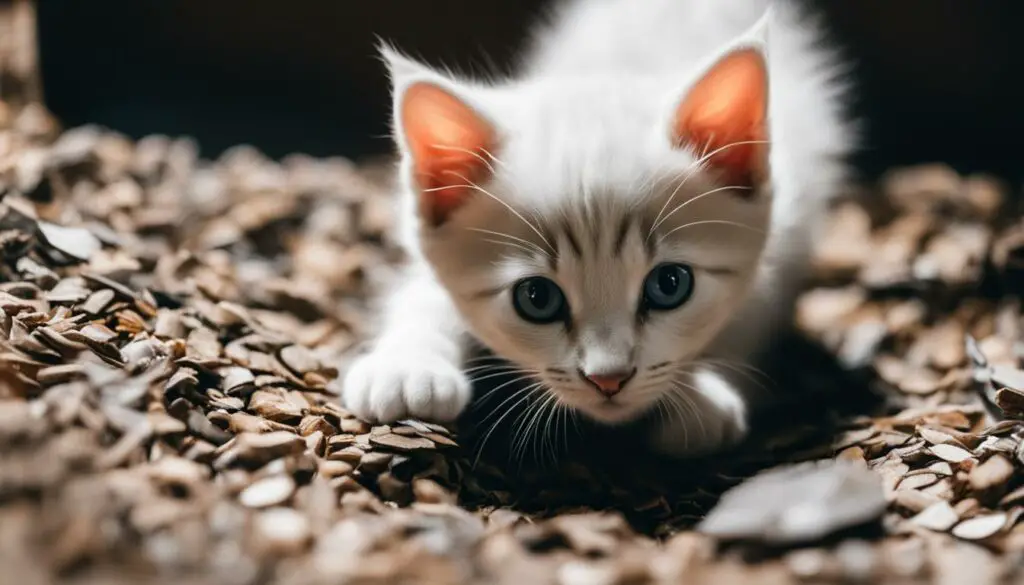
Choosing Kitten-Safe Litter
When it comes to litter for your precious kitten, it’s essential to prioritize their safety and well-being. Opting for a litter that is specifically designed for kittens can help prevent any potential harm or discomfort. Here are some key factors to consider when choosing safe litter for your furry friend:
- Non-toxic composition: Look for litter options that are free from fragrances, harsh chemicals, and clumping properties. These additives can be harmful if ingested by a curious kitten.
- Pellet-based litters: Consider using natural, pellet-based litters that are less likely to be inhaled or consumed by your kitten. This type of litter is generally safer and less abrasive on delicate paws.
- Dust-free formula: Kittens are more sensitive to dust particles, which can irritate their respiratory system. Opt for a litter that is low in dust to ensure a healthier environment for your little one.
- Easy on sensitive paws: Some kittens may have more sensitive paws than others. Choose a litter that provides a comfortable texture and won’t cause any discomfort or scratching.
By selecting a litter that meets these criteria, you can provide a safe and comfortable litter box experience for your kitten. Remember, their health and well-being should always be the top priority.
Selecting the Right Litter Box
When it comes to choosing a litter box for your young kitten, it’s important to consider their needs and preferences. The ideal litter box for young kittens should be open-top and shallow, allowing them easy access and navigation. Avoid tall or covered boxes, as they can be obstacles for small kittens. Consider using a cardboard tray or a small disposable litter box for kittens under 8 weeks old, as these options provide a comfortable and accessible space for them to use.
Another crucial aspect to keep in mind is the placement of the litter box. It should be located in a clean corner away from clutter, providing your kitten with a sense of privacy and security. By placing the litter box in a dedicated area, you help your kitten establish a routine and understand where they should go when nature calls. Keep in mind that kittens are naturally drawn to corners or areas away from their main living space, so choosing a suitable location is essential for their litter box training.
Remember to regularly clean the litter box to maintain hygiene and prevent any odors that might discourage your kitten from using it. Scoop the litter box daily and replace the litter as needed. A clean and fresh litter box environment not only encourages your kitten to use the box but also promotes their overall well-being.
Summary:
- Choose an open-top and shallow litter box for your young kitten. Avoid tall or covered boxes that may be difficult for them to access.
- Consider using a cardboard tray or small disposable litter box for kittens under 8 weeks old.
- Place the litter box in a clean corner away from clutter, providing privacy and security for your kitten.
- Regularly clean the litter box to maintain hygiene and prevent any odors that might discourage your kitten from using it.
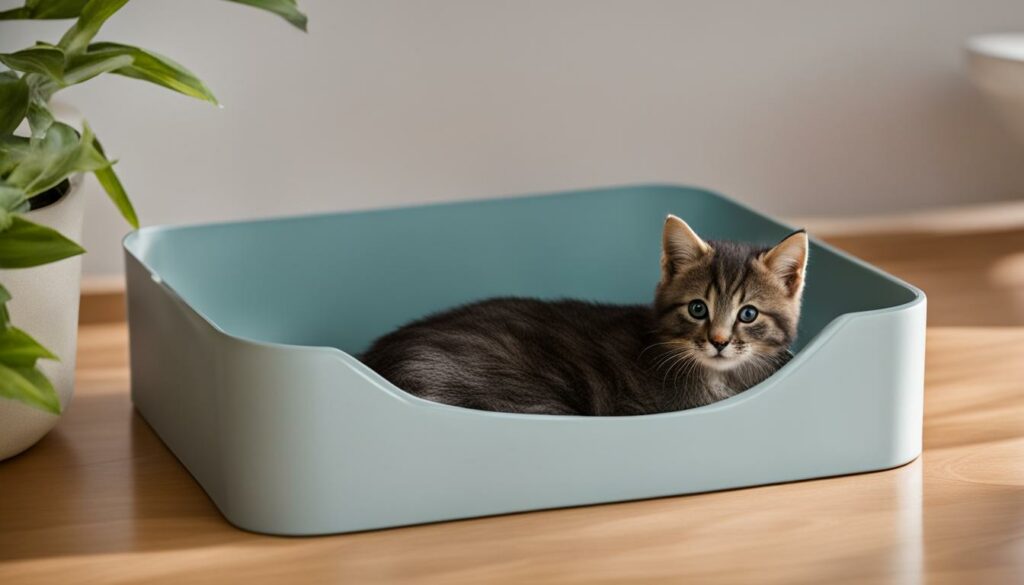
Strategic Placement of the Litter Box
Proper placement of the litter box is crucial for kittens to establish good litter box habits. By strategically positioning the litter box, you can ensure easy access for your 12-week-old kitten and increase the chances of successful litter box training.
Choosing the Right Location
Start by placing the litter box in a clean corner of your home. Kittens are naturally drawn to corners or areas away from their main living space. This corner placement provides a sense of privacy and security for your kitten while using the litter box.
It’s also helpful to keep the litter box within close proximity to your kitten’s main living area. This way, your kitten can easily find the litter box when they need to use it without having to venture too far from their comfort zone.
Creating a Comfortable Environment
In addition to proper placement, it’s important to create a comfortable environment around the litter box. Consider placing a puppy pad underneath the litter box to catch any spills or accidents, making cleanup easier for you.
Keep the litter box area clean and free of any clutter that may deter your kitten from using it. Provide a soft, cozy bed or blanket nearby to make the litter box area inviting and pleasant for your kitten.
Minimizing Disturbances
Kittens can be easily startled or distracted, so it’s important to minimize disturbances around the litter box area. Avoid placing the litter box near noisy appliances, high-traffic areas, or areas where your kitten may encounter other pets or children. This will help your kitten feel calm and focused while using the litter box.
Remember, each kitten is unique, and it may take some trial and error to find the perfect placement for your 12-week-old kitten’s litter box. Pay attention to your kitten’s preferences and behavior, and make any necessary adjustments to ensure their comfort and success in using the litter box.
Positive Reinforcement and Encouragement
When it comes to litter box training, positive reinforcement is key. Kittens respond well to praise and rewards, so make sure to celebrate their successes when they use the litter box correctly. It’s important to create positive associations with the litter box, so avoid scolding or punishment if accidents happen. Instead, focus on encouraging your kitten and creating a supportive environment.
In addition to praise, consider using treats as a form of positive reinforcement. When your kitten successfully uses the litter box, offer them a small treat as a reward. This helps reinforce the connection between using the litter box and receiving a positive outcome. However, be mindful of the type and quantity of treats given to ensure your kitten’s overall health and well-being.
Cleaning up accidents promptly and thoroughly is also crucial. If your kitten consistently uses a specific area outside the litter box, place a litter box in that location to help redirect their behavior. Additionally, you may try switching to a different type of litter or using a litter attractant to enhance your kitten’s understanding of the litter box’s purpose.
Seek Professional Help if Needed
If despite your best efforts, your 12-week-old kitten continues to have litter box issues, it may be beneficial to seek professional help from a certified animal behaviorist or veterinarian. These experts have specialized knowledge and experience in dealing with litter box problems and can provide personalized guidance and solutions tailored to your kitten’s specific needs.
Consulting a specialist for litter box training can be particularly helpful if your kitten’s behavior is causing distress or if you have tried various training methods without success. A professional can assess the situation, identify any underlying behavioral or medical issues, and develop a customized plan to address the problem effectively.
Remember, every kitten is unique, and what works for one may not work for another. Seeking professional help ensures that you receive expert advice based on your specific circumstances, increasing the likelihood of finding a successful solution.
Don’t hesitate to reach out for assistance if you feel overwhelmed or are unsure of how to proceed. With the right guidance, you can overcome litter box challenges and create a positive and harmonious environment for both you and your kitten.
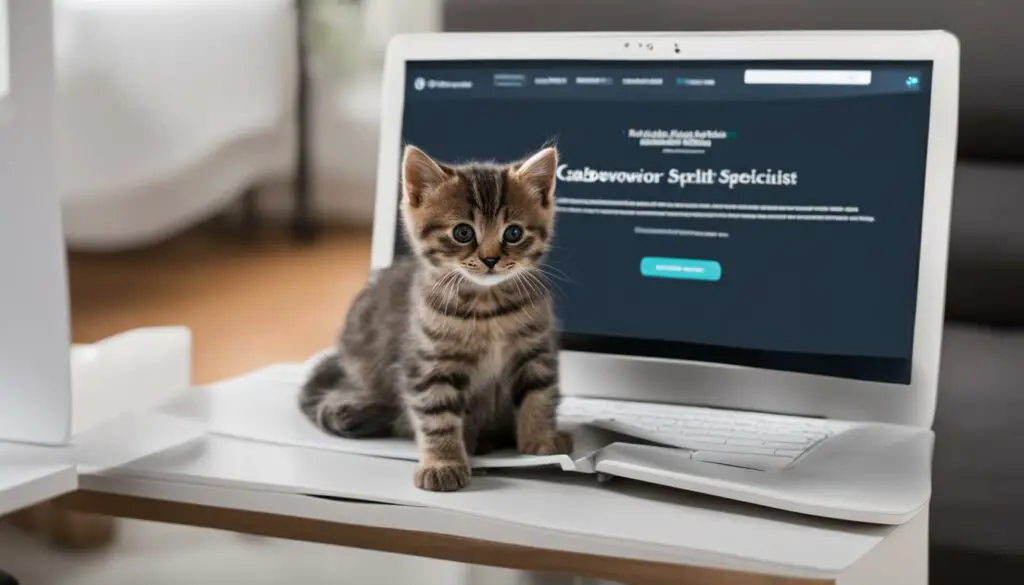
Additional Resources
- Local animal shelters or rescue organizations may offer behavior consultations or recommend specialists.
- Online forums and communities dedicated to cats and kittens can be a valuable source of advice and support from experienced pet owners.
- Books and articles written by professionals in the field of animal behavior can provide in-depth insights and practical strategies to help you overcome litter box issues.
Providing Multiple Litter Box Options
When it comes to litter box training for kittens, providing multiple litter box options can significantly increase their chances of success. By offering different litter box choices, you can cater to your kitten’s individual preferences and ensure they have a comfortable and inviting space to do their business.
One way to provide multiple litter box options is by using various types of litter. Some kittens may prefer a certain texture or scent, so having different options available allows them to choose the litter that suits them best. Consider using clumping litter, non-clumping litter, or even natural alternatives like wood pellets or recycled paper.
Additionally, offering different types of litter boxes can also be beneficial. Some kittens may prefer open-top boxes, while others may feel more secure in covered or hooded ones. Providing a mix of shallow, deep, large, and small boxes allows your kitten to choose the box that they find most comfortable and accessible.
Remember to place the litter boxes in strategic locations throughout your home, making them easily accessible for your kitten. Placing them in quiet, low-traffic areas can help create a sense of privacy and reduce any potential anxiety or stress associated with using the litter box.
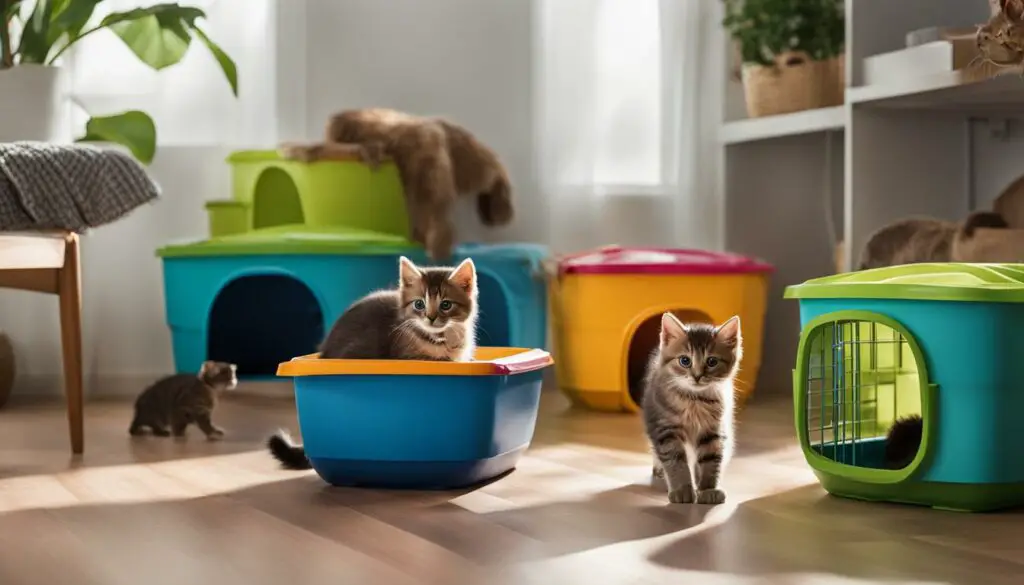
Benefits of Providing Multiple Litter Box Options
Offering multiple litter box options is beneficial for several reasons:
- Reduced Competition: If you have multiple cats in your household, providing several litter boxes helps prevent competition and territorial issues, ensuring each cat has their own designated space.
- Increased Comfort: Kittens have different preferences when it comes to litter and litter box types. Providing options allows them to choose what feels most comfortable to them, increasing their likelihood of using the litter box consistently.
- Prevention of Accidents: By providing multiple litter boxes, you reduce the chances of your kitten having accidents outside the litter box. If one box is occupied or not to their liking, they can easily find another suitable option nearby.
Remember to clean the litter boxes regularly to maintain cleanliness and hygiene. Scoop the litter daily and replace the litter as needed. This ensures a pleasant and inviting environment for your kitten, further encouraging them to use the litter box.
Considering the Kitten’s Coat Type
When it comes to litter box training, the coat type of your kitten can play a role in their willingness to use the litter box. Long-haired kittens, in particular, may have specific preferences and challenges when it comes to litter box usage. The length and texture of their fur can make it more likely for litter to stick to their coat, causing discomfort and aversion to the litter box.
To address this issue, it may be helpful to consider giving your long-haired kitten a hygiene clip. This involves trimming the fur around their hindquarters to prevent litter from sticking to their fur. By keeping their fur shorter in that area, you can minimize the discomfort and encourage better litter box habits.
Remember, each kitten is unique, and some long-haired kittens may not have any issues with litter box usage despite their fur type. However, if you notice that your long-haired kitten is avoiding the litter box or experiencing discomfort, a hygiene clip can be a practical solution to consider.
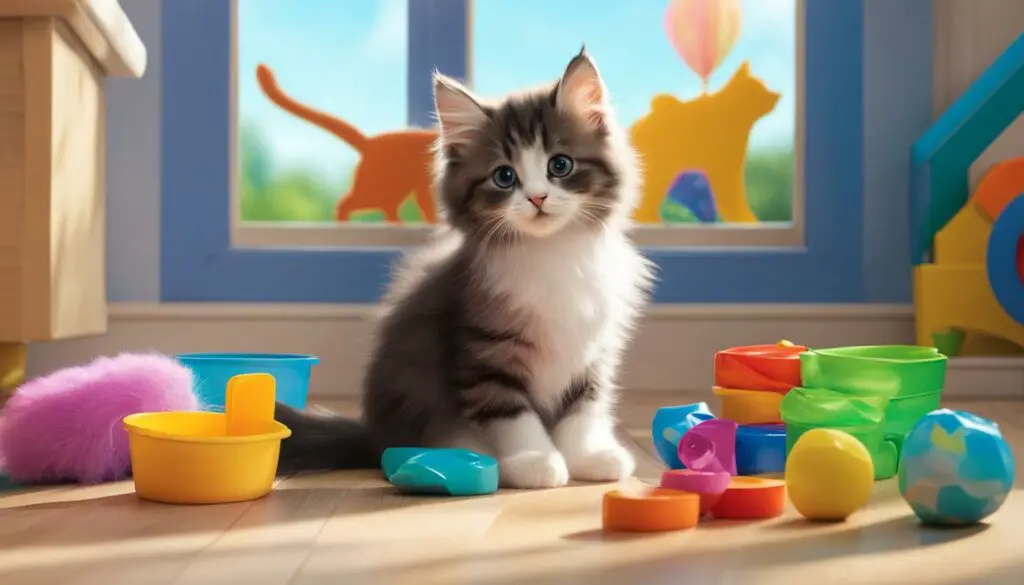
Table: Comparison of Coat Types and Litter Box Issues
| Coat Type | Litter Box Issues |
|---|---|
| Short-haired | Generally less likely to have litter box issues related to their coat. |
| Medium-haired | May experience occasional litter sticking to fur, but usually not a significant issue. |
| Long-haired | More prone to litter sticking to fur, potentially causing discomfort and avoidance of the litter box. |
By understanding your kitten’s coat type and addressing any specific issues related to it, you can ensure a more successful litter box training experience for both you and your furry friend.
Gradual Transition and Persistence
When it comes to litter box training, patience and persistence are key. A gradual transition from your kitten’s initial preferences to the desired litter type can help them develop proper litter box habits. Start by mixing a small amount of the new litter with the old litter, gradually increasing the ratio over time. This allows your kitten to become familiar with the new scent and texture without feeling overwhelmed.
During the transition, it’s important to monitor your kitten’s behavior and make adjustments as needed. If they show resistance or discomfort, slow down the process and give them more time to adjust. Remember, every kitten is unique, and it may take some trial and error to find the litter that works best for them.
In addition to gradual transition, persistence is key in training kittens to use the litter box. Consistency is crucial in reinforcing the desired behavior. Always praise and reward your kitten when they use the litter box correctly, and never punish or scold them for accidents. Creating a positive association with the litter box will encourage your kitten to continue using it.
Creating a Comfortable and Safe Environment for Litter Box Training
When it comes to litter box training your 12-week-old kitten, creating a comfortable and safe environment is crucial for their success. By ensuring your kitten feels secure and at ease during the training process, you can encourage proper litter box habits. Here are some tips to help you provide the ideal environment:
- Choose a quiet and peaceful area: Find a quiet corner in your home where your kitten can have privacy while using the litter box. Avoid placing the litter box in high-traffic areas or near loud appliances to minimize distractions.
- Keep the litter box clean: Regularly scoop the litter box to maintain cleanliness and prevent odors. Cats prefer a clean and fresh litter box, so make it a habit to clean it at least once a day.
- Provide a cozy resting spot nearby: Place a comfortable bed or blanket near the litter box area so that your kitten can rest and relax after using the litter box. This creates a positive association with the area and helps your kitten feel safe and comfortable.
- Use calming pheromone sprays: Consider using calming pheromone sprays or diffusers in the litter box area to create a relaxing atmosphere. These products mimic the natural pheromones that cats release when they feel content and can help reduce stress.
Remember, every kitten is unique, so it may take some trial and error to find the perfect environment for your kitten’s litter box training. By providing a comfortable and safe space, you can set the stage for successful litter box habits and ensure a harmonious relationship with your furry friend.
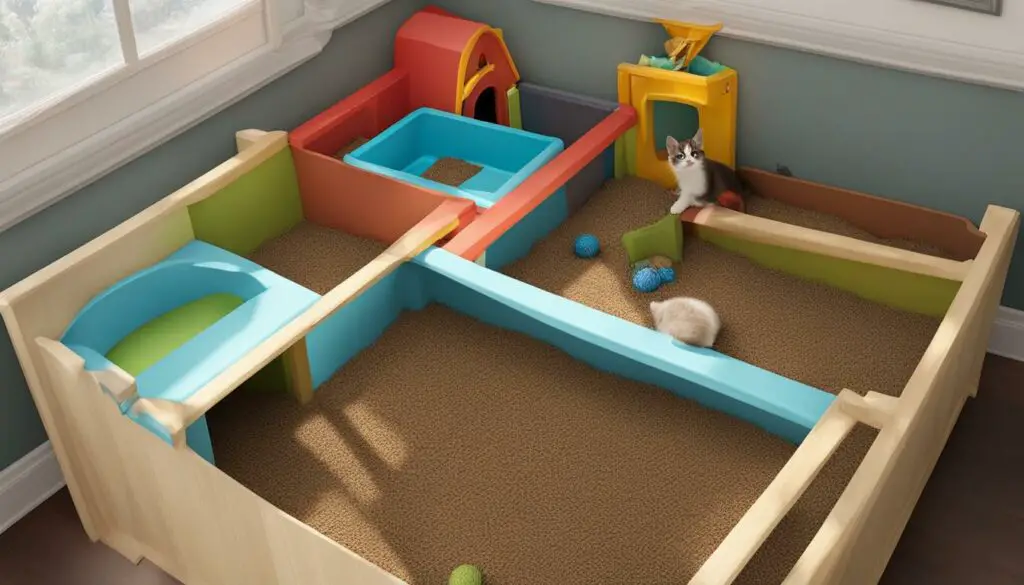
“A comfortable and safe environment is essential for your kitten’s success in litter box training. By creating a quiet and clean space, you can encourage proper elimination behaviors and help your kitten develop positive associations with the litter box.”
Cleanliness and Hygiene in the Litter Box Area: Regular Litter Box Cleaning
When it comes to litter box training for your 12-week-old kitten, maintaining cleanliness and hygiene in the litter box area is crucial. A clean litter box not only promotes good hygiene but also ensures your kitten feels comfortable and motivated to use it. Regular cleaning and maintenance are essential to prevent odors, maintain a healthy environment, and encourage consistent litter box use.
To keep the litter box area clean, it’s important to scoop the litter box daily. Remove any clumps or soiled litter promptly to prevent the buildup of waste. This not only keeps the litter box fresh but also helps your kitten associate the litter box with cleanliness. Additionally, replacing the litter entirely at least once a week will help maintain hygiene and minimize any unpleasant odors.
Along with scooping and replacing litter, it’s important to clean the litter box itself. Regularly washing the litter box with mild soap and warm water helps eliminate bacteria and keeps the box free from any lingering odors. Avoid using harsh chemicals or strong-smelling cleaners, as these may deter your kitten from using the box. Rinse the box thoroughly and allow it to dry completely before refilling with fresh litter.
Remember, cleanliness and hygiene go hand in hand when it comes to your kitten’s litter box training. By maintaining a clean litter box area through regular scooping, litter replacement, and thorough cleaning, you create an inviting and comfortable space for your kitten to confidently use their litter box.
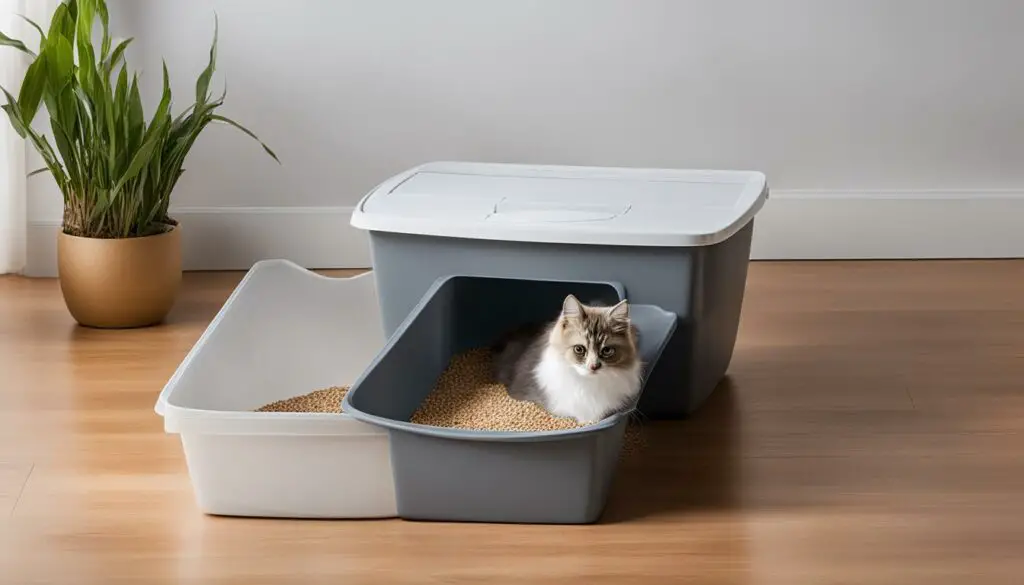
Regular litter box cleaning is key to maintaining cleanliness and hygiene in the litter box area. By keeping the litter box fresh and odor-free, you provide a comfortable environment for your 12-week-old kitten to develop proper litter box habits.
Conclusion
In conclusion, litter box training for 12 week old kittens can be a challenging but essential process. By following the right strategies and remaining patient, you can help your fur baby develop proper litter box habits that will ensure cleanliness and convenience for both of you.
Remember to rule out any medical issues that may be contributing to your kitten’s reluctance to use the litter box. Consulting with a veterinarian is crucial to address any health problems that might be affecting your kitten’s behavior.
Selecting the right litter and litter box, providing positive reinforcement, offering multiple options, and maintaining a clean and comfortable environment are all key factors in successful litter box training. Gradual transition and persistence are necessary for your kitten to develop good litter box habits over time.
By implementing these strategies and creating a safe and inviting space for your kitten, you can ensure their success in using the litter box consistently. With patience, love, and a bit of training, your 12 week old kitten will become a pro at using the litter box, making life easier and more enjoyable for both of you!
FAQ
Why won’t my 12 week old kitten use the litter box?
There could be several reasons why your kitten is not using the litter box. It’s important to rule out any underlying medical issues and ensure their health is not the cause. Additionally, the type of litter and litter box you are using, as well as the placement and cleanliness of the litter box, can affect your kitten’s willingness to use it.
When should I introduce the litter box to my 12 week old kitten?
Kittens typically start using the litter box around 3 weeks of age. It’s best to wait until your kitten is at least 3 weeks old before introducing the litter box. However, every kitten develops at a different pace, so be patient during this process.
What type of litter should I use for my 12 week old kitten?
It’s important to select a litter that is safe for kittens. Avoid litter products with fragrances, harsh chemicals, or clumping properties, as kittens may ingest them. Opt for a natural, pellet-based litter that is less likely to be inhaled or consumed by a young kitten.
What kind of litter box is best for my 12 week old kitten?
Kittens require an open-top, shallow litter box that is easy for them to access and locate. Tall or covered boxes can be obstacles for young kittens. Consider using a cardboard tray or a small disposable litter box for kittens under 8 weeks old.
Where should I place the litter box for my 12 week old kitten?
Proper placement of the litter box is crucial for kittens. They are drawn to corners or areas away from their main home base. Start by placing the litter box in a clean corner, ideally with a puppy pad underneath for easier cleanup. Keep the litter box within close proximity to the kitten’s main living area to ensure easy access.
How can I encourage my 12 week old kitten to use the litter box?
Kittens respond well to positive reinforcement during litter box training. Praise your kitten when they use the litter box correctly. Clean up accidents promptly to avoid scent association. If your kitten consistently uses a specific area outside the litter box, place a litter box in that location. Consider switching to a new litter or using a litter attractant if your kitten is struggling to understand the box.
What should I do if my 12 week old kitten still won’t use the litter box?
If your kitten’s litter box problem persists despite your best efforts, it may be beneficial to seek professional help from a certified animal behaviorist or veterinarian. They can provide personalized guidance and solutions to address your kitten’s specific needs.
Should I provide multiple litter box options for my 12 week old kitten?
To increase the chances of your kitten using the litter box, consider providing multiple litter box options. Use different types of litter and various shallow boxes to create a litter cafeteria or buffet. This allows the kitten to choose their preferred litter and encourages proper litter box usage.
How can I make litter box training easier for my 12 week old long-haired kitten?
Some long-haired kittens have preferences when it comes to litter. Consider whether your kitten’s fur may be contributing to their reluctance to use the litter box. Some long-haired kittens may benefit from a hygiene clip to prevent litter sticking to their fur.
How long does it take to litter box train a 12 week old kitten?
Litter box training takes time and patience. Gradually transition your kitten from their initial litter preferences to the desired litter type. Be persistent in your training efforts and provide consistent reinforcement. With time, your kitten should develop proper litter box habits.
How can I create a comfortable environment for litter box training my 12 week old kitten?
Kitten’s environment plays a crucial role in their litter box training. Make sure they feel safe and secure by providing a comfortable space. Avoid any stressful situations or loud noises during the training process. A calm and peaceful environment enhances the likelihood of successful litter box training.
How often should I clean the litter box for my 12 week old kitten?
Regularly clean the litter box to maintain good hygiene and prevent any odors that might discourage your kitten from using it. Scoop the litter box daily and replace litter as needed. Keeping a clean litter box environment is essential for your kitten’s comfort and consistent litter box use.

